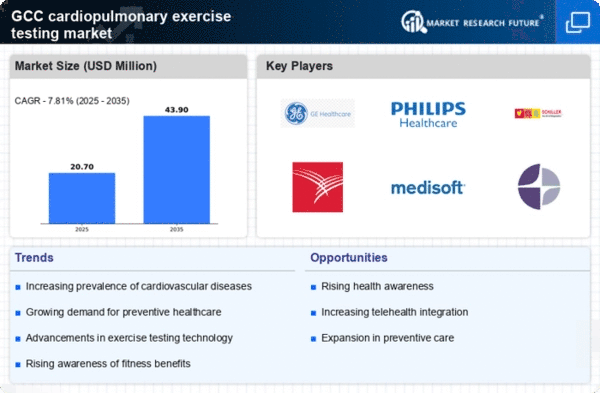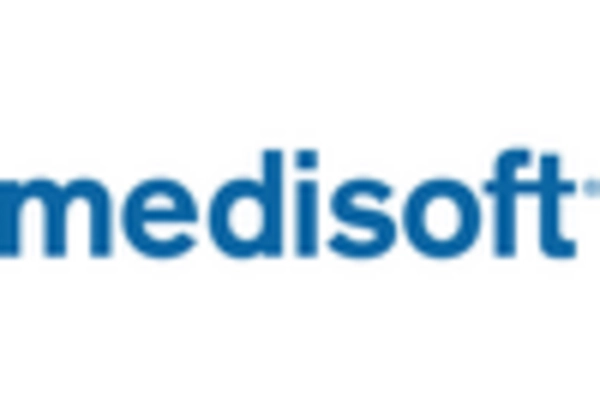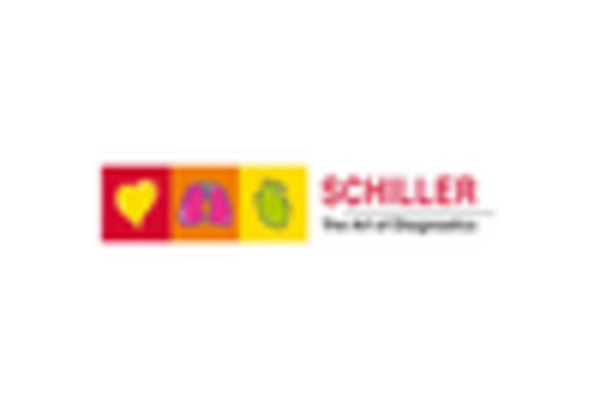Focus on Chronic Disease Management
The cardiopulmonary exercise testing market is increasingly aligned with the focus on chronic disease management in the GCC. As the prevalence of chronic conditions such as diabetes and hypertension rises, healthcare providers are recognizing the importance of comprehensive assessments, including cardiopulmonary exercise testing. This testing plays a critical role in evaluating the functional capacity of patients with chronic diseases, guiding treatment decisions and monitoring progress. The market is anticipated to grow at a rate of approximately 8% as healthcare systems prioritize effective management strategies for chronic conditions. Additionally, the integration of cardiopulmonary exercise testing into chronic disease management programs is likely to enhance patient outcomes, further solidifying its significance in the healthcare landscape.
Technological Integration in Healthcare
The cardiopulmonary exercise-testing market is increasingly influenced by the integration of technology in healthcare. Innovations such as telemedicine and digital health platforms are transforming how cardiopulmonary exercise tests are conducted and interpreted. This integration allows for remote monitoring and analysis, making testing more accessible to patients across the GCC. The market is projected to grow by approximately 9% as healthcare providers adopt these technologies to enhance patient engagement and streamline testing processes. Furthermore, the use of artificial intelligence in data analysis is likely to improve diagnostic accuracy, thereby reinforcing the value of cardiopulmonary exercise testing in clinical practice. As technology continues to evolve, its impact on the cardiopulmonary exercise-testing market is expected to be profound, potentially reshaping the landscape of patient care.
Growing Demand for Personalized Medicine
The cardiopulmonary exercise-testing market is experiencing a notable increase in demand for personalized medicine. This trend is driven by the need for tailored treatment plans that consider individual patient characteristics. As healthcare providers in the GCC region increasingly adopt personalized approaches, the relevance of cardiopulmonary exercise testing becomes apparent. This testing allows for precise assessments of cardiovascular and pulmonary function, enabling clinicians to customize interventions effectively. The market is projected to grow at a CAGR of approximately 8% over the next five years, reflecting the rising emphasis on individualized patient care. Furthermore, advancements in testing technologies are likely to enhance the accuracy and reliability of results, further driving market growth. As healthcare systems evolve, the integration of cardiopulmonary exercise testing into routine clinical practice is expected to become more prevalent, thereby solidifying its role in personalized medicine.
Rising Awareness of Cardiovascular Health
The cardiopulmonary exercise testing market is witnessing a surge in awareness regarding cardiovascular health among the population in the GCC. Public health campaigns and educational initiatives are increasingly emphasizing the importance of regular health screenings, including cardiopulmonary exercise tests. This heightened awareness is likely to lead to a greater demand for testing services, as individuals become more proactive about their health. According to recent surveys, approximately 60% of adults in the GCC are now aware of the benefits of cardiovascular assessments. This trend is expected to drive market growth by approximately 6% over the next few years. As more individuals seek preventive measures and early detection of cardiovascular issues, the cardiopulmonary exercise-testing market is poised to expand significantly, reflecting a shift towards a more health-conscious society.
Increased Investment in Healthcare Infrastructure
The cardiopulmonary exercise-testing market is benefiting from increased investment in healthcare infrastructure across the GCC. Governments and private entities are allocating substantial resources to enhance healthcare facilities, which includes the acquisition of advanced diagnostic equipment. This investment is crucial for improving the quality of care and expanding access to essential services, including cardiopulmonary exercise testing. For instance, the GCC region has seen a surge in the establishment of specialized clinics and hospitals equipped with state-of-the-art technology. This trend is expected to contribute to a projected market growth of around 7% annually. Enhanced infrastructure not only facilitates better patient outcomes but also encourages healthcare professionals to adopt innovative testing methods, thereby reinforcing the importance of cardiopulmonary exercise testing in clinical settings.

















